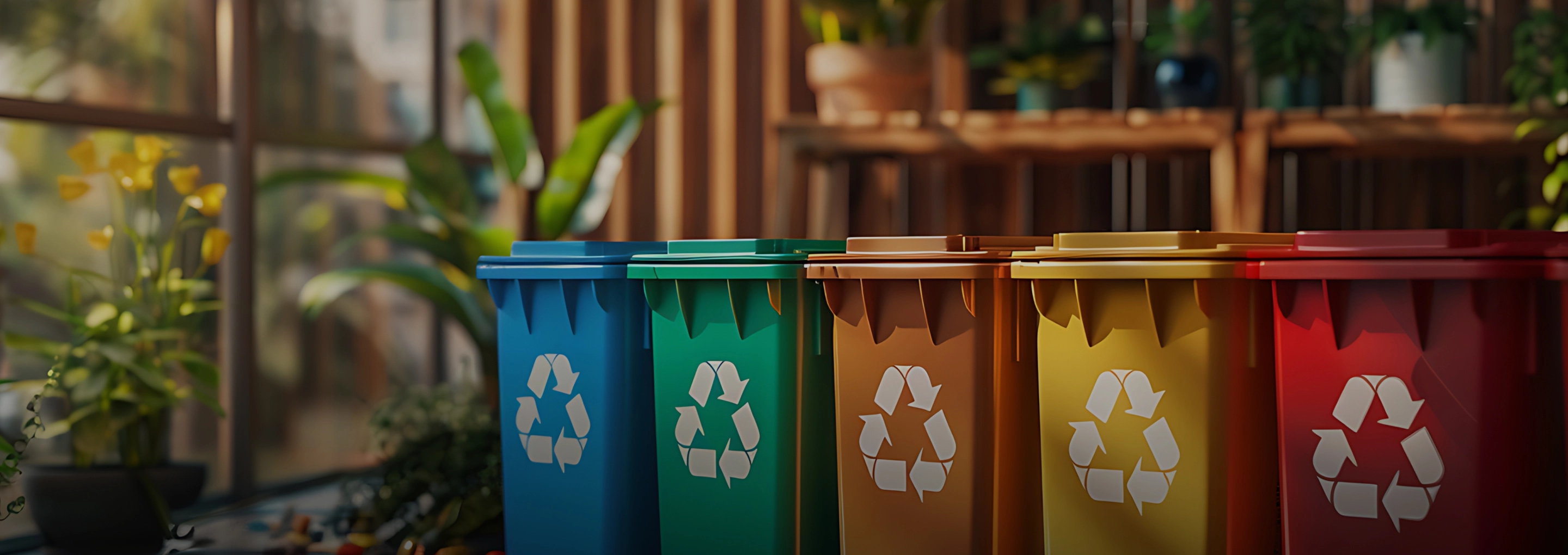
Waste Management
Importance and Mission
The significance of Waste Management and the Circular Economy to the Group. Waste management and the circular economy are at the core of the Group’s mission to maximize resource efficiency, minimize waste, and promote material reuse wherever possible. The Group focuses on the principles of reducing consumption, reusing, and recycling (Reduce, Reuse, Recycle) to extend the lifespan of materials and reduce environmental impact. In the case of biomass energy, we actively promote the beneficial use of by-products, such as converting biomass ash into soil conditioners to improve acidity levels, with approval from the Agricultural Research and Development Division, Department of Agriculture. This practice reduces the volume of waste that needs to be disposed of. Through innovative waste management strategies, responsible sourcing of raw materials, and strong recycling initiatives, we are committed to closing the resource loop in our operations. This approach not only supports global sustainability goals but also improves resource efficiency, reduces costs, and strengthens our environmental responsibility, ensuring the long-term sustainability of our renewable energy for future generations.
SDGs in the Waste Management
Goals and Performance Highlights
Goals
Performance Highlights 2024
The Company has started a campaign to reduce the use of private cars for commuting to reduce greenhouse gas emissions. The Company also organizes tree-planting activities for employees every year.
This table can be scrolled horizontally
| Waste | Unit | SPN | WVO | SN | UPT | WINCHAI1 | TGC | TTQN | SSE1 | TTTV | SEG1 | Total |
|---|---|---|---|---|---|---|---|---|---|---|---|---|
| Performance Results from Organizational Goals | ||||||||||||
| Reduce non-hazardous waste in the organization by 10% by 2030 | % | 100 | 79.5 | N/A | 22.03 | N/A | N/A | 62.06 | N/A | 2.87 | N/A | 22.05 |
| Achieve zero disposal of hazardous waste by landfills by 2030 | % | 98.95 | 0 | N/A | 0.2 | N/A | 100 | 100 | N/A | 100 | N/A | 2.76 |
| Achieve a recycling rate at least 80% of total waste through the 3Rs (Reduce, Reuse, and Recycle) by 2030. | % | 1.05 | 72.9 | N/A | 99.8 | N/A | 0 | 0 | N/A | 0 | N/A | 97.23 |
| Waste Generated from all Operations | ||||||||||||
| Non-hazardous waste 2 | Ton | 0 | 0.35 | 0 | 5,024.24 | 0 | 0.15 | 0.10 | 0 | 1.32 | 0 | 5,026.16 |
| Hazardous Waste | Ton | 132.8 | 0.13 | 0 | 8.41 | 0 | 0 | 0 | 0 | 0.04 | 0 | 141.38 |
| Non-hazardous Waste Management | ||||||||||||
| Reuse | Ton | 0 | 0 | 0 | 0 | 0 | 0 | 0 | 0 | 0 | 0 | 0 |
| Recycle | Ton | 0 | 0.35 | 0 | 5,022.82 | 0 | 0 | 0 | 0 | 0 | 0 | 5,023.17 |
| Landfills | Ton | 0 | 0 | 0 | 1.42 | 0 | 0.15 | 0.10 | 0 | 1.32 | 0 | 2.99 |
| Others | Ton | 0 | 0 | 0 | 0 | 0 | 0 | 0 | 0 | 0 | 0 | 0 |
| Hazardous Waste Management | ||||||||||||
| Recycle | Ton | 1.4 | 0 | 0 | 0 | 0 | 0 | 0 | 0 | 0 | 0 | 1.4 |
| Landfills | Ton | 131.4 | 0 | 0 | 8.41 | 0 | 0 | 0 | 0 | 0.04 | 0 | 139.85 |
| Others | Ton | 0 | 0.13 | 0 | 0 | 0 | 0 | 0 | 0 | 0 | 0 | 0.13 |
Notes : Disposal of hazardous waste, such as damaged, defective, or degraded solar panels, is carried out by licensed and registered waste management companies.
1 For the Winchai, SSE, and SEG projects, all waste generated from production and maintenance processes is handled by the O&M contractors; therefore, this data is excluded to avoid double-counting.
2 For non-hazardous waste in 2024, projects in Thailand including SPN, WVO, SN, and Winchai are reported. However, municipal solid waste (waste from domestic consumption) is not included due to the lack of recorded data.
Management Approach
Waste management is carried out effectively and aligned with the principles of a circular economy, focusing on reducing waste at the source (Reduce), reusing (Reuse), and recycling (Recycle) to optimize resource utilization. Strict control measures are enforced throughout every process, from the proper sorting and storage of waste, to reusing by-products, utilizing modern recycling technologies, and managing biomass waste by converting it into energy or valuable products. The Group aims to minimize waste disposal through incineration or landfilling. For hazardous waste, the Group contracts specialized and registered entities that are authorized to dispose of waste correctly, such as solar panel waste.
In addition, the Group continuously monitors and tracks waste quantities, ensuring compliance with international environmental standards and relevant regulations. This approach helps guarantee that operations do not negatively impact the environment or local communities, while steering the organization toward a sustainable circular economy.





